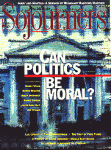Over the past several years, a group of musicians have made their voices heard under the unofficial banner of "artists of conscience." Known for uncompromising stands on social issues as well as writing good music, artists such as Midnight Oil, Bruce Cockburn, and Indigo Girls, to name but a few, are blazing a new trail for less established musicians.
Joining this league with what is probably one of the finest rap albums to come out since Public Enemy's It Takes a Nation of Millions to Hold Us Back is San Francisco's Disposable Heroes of Hiphoprisy. But the Heroes' Hypocrisy is the Greatest Luxury is better written and crafted than anything PE, or most rap groups for that matter, has done to date.
Michael Franti and Ron Tse, formerly of The Beatnigs, have taken what they have learned, both in music and life, while playing in that band. Franti's writing/rapping (which is something like Noam Chomsky teaming up with dub-poet Linton Kwesi Johnson) and Tse's post-industrial machinations work in tandem to paint a detailed, full-color mural of life in North America.
Thematically, the collection of songs sounds like a beat manifesto. "Satanic Reverses" chronicles the erosion of civil rights in the United States, while the brilliant "Television, Drug of the Nation" proposes that "One Nation Under God has turned into One nation under the influence of one drug/Television, the drug of the Nation/ breeding ignorance and feeding radiation."
From there the Heroes take on the Gulf war ("Winter of the Long Hot Summer"), poverty and consumerism ("Financial Leprosy"), the myth of the celebrity ("Famous and Dandy [Like Amos 'n' Andy]"), and the state of politics in California ("California Uber Alles").
However, even with Franti's strong writing and Tse's unique soundscapes, the album would come off as just another fist pumping in the air were it not for songs such as "Music and Politics" and the title track.
From "Music and Politics": "If ever I would stop thinking about music and politics/...I'd tell you that I'm suffering from the worst type of loneliness/The loneliness of being misunderstood, or more poignantly, the loneliness of being afraid to allow myself to be understood." Certainly these words do not reflect the macho posturing displayed on Yo! MTV Raps.
And, on the title track, Franti is even more frank about the conflict he experiences as an artist in the music industry. "It's tough to make a living when you're an artist/It's even tougher when you're socially conscious/Careerism, opportunism can turn the politics into cartoonism/Let's not patronize or criticize/Let's open the door and look inside."
WHILE THE DISPOSABLE HEROES' social conscience is exhibited in detail and footnotes, Native American activist John Trudell uses his poetry to paint a much starker picture of life for Native Americans on the res, on the streets, and in the country with his poetry.
AKA Grafitti Man is a compilation of songs taken from Trudell's self-distributed cassette releases over the past few years. Produced by Jackson Browne, the music is basic blues rock evoking early Bob Dylan circa Highway 61 Revisited, The Band, and even some Credence Clearwater Revival. Trudell's sonorous voice, with hints of Lou Reed, Bruce Cockburn, and Leonard Cohen, is full of anger, hurt, and wonder.
Trudell, who recently appeared in the film Thunderheart and the documentary about the America Indian Movement, Incident at Oglala, has plenty of experience to draw on to fuel his poems. In 1979 Trudell, who was the national chairperson for the American Indian Movement, lost his wife and three children to a fire he believes was set by government assassins.
Trudell lashes out at the destruction brought on by the Gulf war with "Bombs Over Baghdad," one of the most powerful anti-war songs since Dylan's "Masters of War." "Vampires drinking blood and oil cocktails/Their violence works, it hardly ever fails/New world order is an old world lie/Stop mad man from running loose/Mother earth can't take the abuse." In the same song, he connects the violence so far away with the violence everywhere. "Central America bleeding, wounds same as Palestine and Harlem, Three Mile Island, El Salvador, Pine Ridge and Belfast/The poor starving for food, starving for land, starving for peace, starving for real."
On an entirely different note, Trudell pays tribute to Elvis as the "Baby Boom Che," tracing Elvis' rise with the revolution that went on in people's hearts following World War II and the beginning of rock and roll. "Rock and roll was based on revolution going way past 33 1/3."
But just as the most personal songs of the Disposable Heroes are the most powerful, so are Trudell's love songs, filled with hurt and longing. "What He Did" takes the promise of hope springing eternal and crushes it with the betrayal of infidelity. "Beauty in a Fade," with its simple drumming and chanting, is a strikingly beautiful portrayal of two people's dreams and expectations not coinciding. She leaves, he's left wondering.
There is much speculation on whether these new "artists of conscience" are signaling a rebirth of the protest music of the early '60s. The fact is, as long as people care enough to voice their love and anger, there will always be not only artists but people of conscience.
Ron Wall was a free-lance writer living in Calgary, Alberta when this review appeared.
Hypocrisy is the Greatest Luxury. By the Disposable Heroes of Hiphoprisy. Produced by Fourth and B'way. Released by Island Records. 1991.
AKA Grafitti Man. By John Trudell. Released by Rykodisc. 1992.

Got something to say about what you're reading? We value your feedback!
